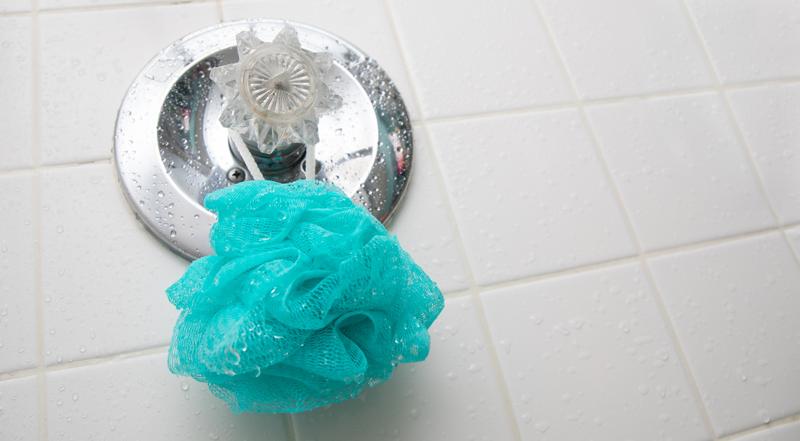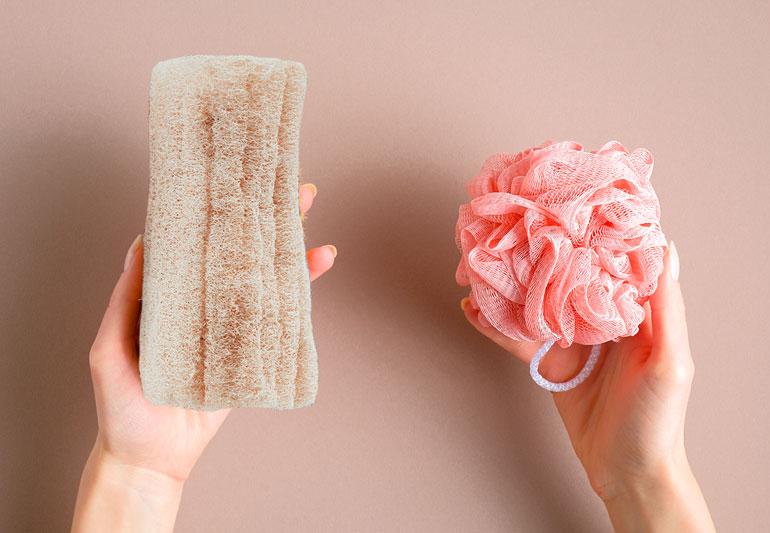Your shower pouf is more than just a bathroom accessory—it’s a key part of your daily routine. But have you ever stopped to think about how often you should change it?
Using the same pouf for too long can lead to bacteria buildup, skin irritation, and an unpleasant shower experience. You’ll discover the simple signs that tell you it’s time for a fresh one, how often experts recommend replacing your pouf, and easy tips to keep your skin healthy and glowing.
Keep reading to make sure your shower routine is both safe and refreshing every time.
Why Shower Poufs Need Regular Changing
Shower poufs collect dead skin, water, and soap residue. This makes them a perfect place for bacteria and mold. Using the same pouf for too long can harm your skin and overall hygiene. Changing your shower pouf regularly keeps your skin healthy and prevents infections.
Bacteria And Mold Growth Risks
Shower poufs stay wet for a long time. This dampness helps bacteria and mold grow fast. These germs can cause skin infections or irritations. A dirty pouf can also spread unpleasant smells in your bathroom.
Impact On Skin Health
Old poufs may not clean your skin well. They can trap dead skin and oil, causing clogged pores. This leads to acne and skin irritation. Fresh poufs help remove dirt gently and keep your skin smooth.
Signs Your Pouf Is Worn Out
- Foul or musty smell
- Discoloration or visible mold spots
- Frayed or torn mesh material
- Loss of shape and firmness
These signs mean it is time to replace your shower pouf.

Credit: rawsugarliving.com
Recommended Replacement Frequency
Knowing when to replace your shower pouf helps keep your skin clean and healthy. Shower poufs can trap bacteria and mildew over time. Changing them regularly prevents skin irritation and bad smells. The replacement frequency depends on general advice and personal use conditions.
General Guidelines
Most experts suggest changing your shower pouf every 3 to 4 weeks. This timing helps avoid bacteria buildup. Using a new pouf often keeps your skin fresh and your shower routine safe. If you use your pouf daily, stick to the monthly change rule. This simple habit reduces the risk of skin problems.
Factors That Affect Replacement Timing
Several factors can make you change your pouf sooner or later:
- Frequency of Use:More use means faster wear and bacteria growth.
- Drying Conditions:Poufs that dry quickly last longer. Damp poufs grow mold faster.
- Material Quality:High-quality poufs stay clean and intact longer.
- Skin Sensitivity:Sensitive skin may need more frequent changes to avoid irritation.
- Visible Wear:If your pouf looks worn or smells bad, replace it immediately.
Maintaining Your Shower Pouf
Shower poufs should be replaced every 3 to 4 weeks to prevent bacteria buildup. Regularly rinsing and drying them helps keep them fresh longer. Changing often ensures a clean and safe shower experience.
Maintaining your shower pouf is essential for ensuring it remains a hygienic and effective tool in your daily bathing routine. You might not think much about this fluffy accessory, but it deserves your attention. A neglected shower pouf can become a breeding ground for bacteria, affecting both your skin health and the lifespan of the pouf itself.Proper Cleaning Techniques
Cleaning your shower pouf regularly is crucial. A good rule of thumb is to wash it at least once a week. You can soak it in a mixture of warm water and a few drops of antibacterial soap for about 15 minutes. For a deeper clean, consider using a diluted vinegar solution. After soaking, rinse it thoroughly under running water. This practice not only eliminates bacteria but also keeps your pouf smelling fresh.Drying And Storage Tips
Proper drying is just as important as cleaning. After each use, make sure to shake out excess water. Hang your pouf in a well-ventilated area, preferably outside the shower, to allow it to dry completely. Avoid storing it in a dark, damp environment as this promotes mold growth. By ensuring your pouf dries fully between uses, you extend its life and maintain hygiene. Have you ever noticed a lingering musty smell from your pouf? That’s a sign it isn’t drying properly. Adjust your storage routine to prevent this issue and enjoy a fresh, clean pouf every shower.
Credit: health.clevelandclinic.org
Alternatives To Traditional Shower Poufs
Traditional shower poufs work well but can harbor bacteria and wear out fast. Alternatives offer different textures and benefits. They may last longer or be gentler on skin. Choosing the right option depends on personal preference and skin type. Below are some popular alternatives worth trying.
Natural Sponges
Natural sponges come from the sea and are biodegradable. They feel soft and gentle on the skin. These sponges absorb water easily and create rich lather. They dry faster than synthetic poufs, reducing mold risk. Cleaning is simple with rinsing and air drying. Natural sponges offer a more eco-friendly bathing option.
Silicone Scrubbers
Silicone scrubbers resist bacteria and dry quickly. Their soft, flexible bristles provide a gentle massage. Silicone is durable and easy to clean with soap. These scrubbers do not shed like traditional poufs. They work well for sensitive or acne-prone skin. Silicone scrubbers are a hygienic, long-lasting choice.
Washcloths And Loofahs
Washcloths are soft, reusable, and easy to wash. They offer gentle exfoliation and can last months. Loofahs are natural plant fibers that exfoliate well. They help remove dead skin and improve circulation. Both options dry faster than poufs, lowering bacteria growth. Washcloths and loofahs provide simple, eco-conscious alternatives.
Benefits Of Regular Pouf Replacement
Changing your shower pouf regularly offers many benefits. It keeps your bathing routine clean and safe. A fresh pouf supports better skin health. It stops germs and bacteria from building up. These points help you enjoy a more pleasant shower every day.
Improved Hygiene
Old shower poufs trap dirt and bacteria. This can lead to unpleasant odors and infections. Replacing your pouf stops this buildup. It keeps your shower tools clean and fresh. Clean poufs reduce the chance of spreading germs on your skin.
Enhanced Skin Care
A new pouf helps exfoliate dead skin gently. It improves skin texture and glow. Old poufs lose their scrubbing power and become rough. Fresh poufs provide better lather and clean pores deeply. This makes your skin feel softer and smoother after every shower.
Preventing Skin Irritations
Using a dirty pouf can cause redness and itching. Bacteria and mold growth irritate sensitive skin. Changing your pouf often reduces these risks. It protects your skin from rashes and infections. Healthy skin starts with clean shower accessories.

Credit: health.clevelandclinic.org
Frequently Asked Questions
How Often Should You Replace Your Shower Pouf?
Replace your shower pouf every 3 to 4 weeks. This prevents bacteria buildup and keeps your skin healthy. Frequent replacement ensures hygiene and avoids unpleasant odors.
Can You Clean And Reuse A Shower Pouf?
Yes, you can clean your shower pouf weekly. Rinse it thoroughly and let it dry completely to avoid mold. However, regular replacement is still recommended for best hygiene.
What Happens If You Don’t Change Your Shower Pouf?
Not changing your shower pouf can cause bacteria growth. This may lead to skin irritation or infections. It also results in a smelly, unsanitary bath accessory.
Are Shower Poufs Harmful If Used Too Long?
Using a shower pouf too long can harm your skin. It traps dead skin cells and bacteria, causing breakouts or infections. Regular replacement keeps your shower pouf safe and clean.
Conclusion
Changing your shower pouf regularly keeps your skin healthy. Old poufs collect bacteria and can cause irritation. Replace it every three to four weeks for best results. Rinse it well after each use and let it dry. Clean habits help prevent germs and keep showers fresh.
A small routine change can make a big difference. Remember, a clean pouf means cleaner skin and a better shower experience. Simple steps lead to better hygiene every day.





